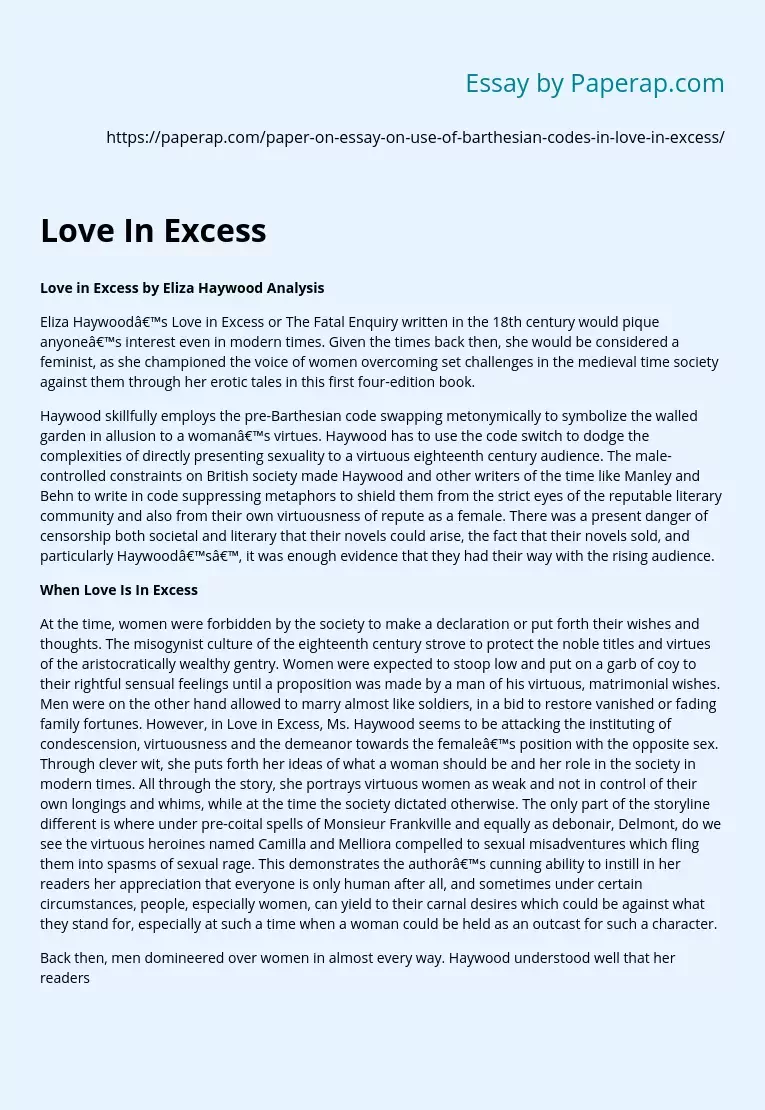Love in Excess by Eliza Haywood
The following sample essay is about Eliza Haywood’s novel Love Abundant. Read the introduction, body and conclusion of the essay, scroll down.
Eliza Haywood’s Love in Excess or The Fatal Enquiry written in the 18th century would pique anyone’s interest even in modern times. Given the times back then, she would be considered a feminist, as she championed the voice of women overcoming set challenges in the medieval time society against them through her erotic tales in this first four-edition book.
Haywood skillfully employs the pre-Barthesian code swapping metonymically to symbolize the walled garden in allusion to a woman’s virtues. Haywood has to use the code switch to dodge the complexities of directly presenting sexuality to a virtuous eighteenth century audience. The male-controlled constraints on British society made Haywood and other writers of the time like Manley and Behn to write in code suppressing metaphors to shield them from the strict eyes of the reputable literary community and also from their own virtuousness of repute as a female.
There was a present danger of censorship both societal and literary that their novels could arise, the fact that their novels sold, and particularly Haywood’s’, it was enough evidence that they had their way with the rising audience.
When Love Is In Excess
At the time, women were forbidden by the society to make a declaration or put forth their wishes and thoughts. The misogynist culture of the eighteenth century strove to protect the noble titles and virtues of the aristocratically wealthy gentry.
Women were expected to stoop low and put on a garb of coy to their rightful sensual feelings until a proposition was made by a man of his virtuous, matrimonial wishes. Men were on the other hand allowed to marry almost like soldiers, in a bid to restore vanished or fading family fortunes. However, in Love in Excess, Ms. Haywood seems to be attacking the instituting of condescension, virtuousness and the demeanor towards the female’s position with the opposite sex. Through clever wit, she puts forth her ideas of what a woman should be and her role in the society in modern times. All through the story, she portrays virtuous women as weak and not in control of their own longings and whims, while at the time the society dictated otherwise. The only part of the storyline different is where under pre-coital spells of Monsieur Frankville and equally as debonair, Delmont, do we see the virtuous heroines named Camilla and Melliora compelled to sexual misadventures which fling them into spasms of sexual rage. This demonstrates the author’s cunning ability to instill in her readers her appreciation that everyone is only human after all, and sometimes under certain circumstances, people, especially women, can yield to their carnal desires which could be against what they stand for, especially at such a time when a woman could be held as an outcast for such a character.
Back then, men domineered over women in almost every way. Haywood understood well that her readers underwent a lot of challenges in the society due to men. She brings this out well where Amena’s father refuses to let his daughter to keep meeting with Delmont before he proposes marriage. Since women were not permitted to show their affections or their preference of choice, it is rather unrealistic in those times that not one but two upper-class ladies of disparate wealth would openly compete for a man’s attentions. Alovisa writes Delmont an unsigned letter hoping to elicit a certain amorous response from him, but which inadvertently leads Delmont and Amena to fall in love. Love in Excess suggests passionate emotion or love is a universal sentiment, with the characters’ thoughts postulating that the universal language of love melts down the prominence of gender. Yet sometimes some seemingly male-chauvinistic decisions are made for the better. When Amena discovers that Alovisa was sending Delmont love letters, she begs his father to send her away to the convent on the countryside as soon as possible, though his father had planned to do that with the help of Alovisa behind her back. Under the re-awakened and rapture of virtuousness of the church, Amena casts off the wanton wants and desires she had with Delmont, and has the holy spirit to quench her secular desires.
Love in Excess by Eliza Haywood. (2019, Dec 05). Retrieved from https://paperap.com/paper-on-essay-on-use-of-barthesian-codes-in-love-in-excess/

